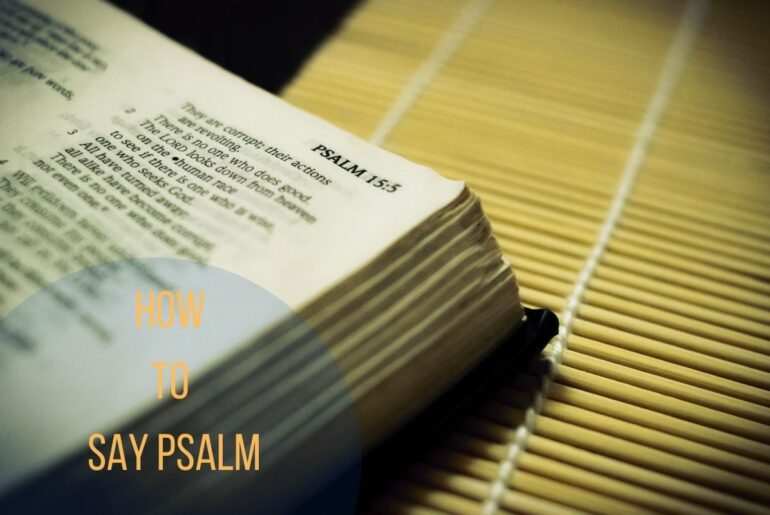Psalms, an integral part of the Bible, are known for their spiritual and poetic significance. Whether you’re a devout believer or simply interested in exploring the beauty of scripture, knowing how to correctly pronounce Psalms can enhance your understanding and connection with these sacred verses. In this article, we will delve into the art of saying Psalms effectively, providing you with insights, tips, and even Bible verses to deepen your appreciation.
Contents
How To Say Psalms: A Comprehensive Guide
Before we dive into pronunciation, it’s essential to grasp the profound significance of Psalms. These verses, often attributed to King David, express a wide range of human emotions, from joy and praise to sorrow and supplication. They have been recited and sung for centuries in various religious and spiritual traditions, offering solace and guidance to countless individuals.
Understanding the Book of Psalms
The Book of Psalms is a diverse collection of writings that cover a wide range of emotions and topics. It includes expressions of joy, sorrow, praise, and petition. These Psalms have been used for worship, meditation, and reflection for centuries, making them an integral part of many religious traditions.
Why Say or Recite Psalms?
Saying or reciting Psalms can have a profound impact on your spiritual life. These verses offer solace during difficult times, inspire gratitude in moments of joy, and create a sense of connection with the divine. They provide a powerful way to express your innermost thoughts and feelings.
The Basics of Pronouncing Psalms
Phonetic Breakdown
Pronouncing Psalms correctly starts with understanding the phonetics. Each word in the Psalms has a specific pronunciation, and paying attention to vowels and consonants is crucial. Many words have unique stress patterns that affect their pronunciation.
Common Mispronunciations
We will also address common mispronunciations that can affect the meaning and flow of the verses. By identifying these pitfalls, you can avoid them and ensure a more authentic recitation.
Tips for Effective Psalm Pronunciation
Stress on Vowel Sounds
Vowels play a significant role in pronunciation. We’ll explore how emphasizing vowel sounds can help you maintain accuracy while reciting Psalms.
Pay Attention to Consonants
Consonants, too, have their nuances. We will discuss how consonants can influence the overall pronunciation and cadence of Psalms.
The Importance of Pace and Rhythm
Pace and rhythm are essential elements in conveying the intended meaning and emotion within Psalms. We’ll provide tips on finding the right tempo for your recitation.
Bible Verses Highlighting the Beauty of Psalms
Throughout this article, we’ll include relevant Bible verses that highlight the beauty and power of Psalms. These verses will serve as examples and inspiration for your own exploration of these sacred texts.
1. Psalm 19:7-8 (NIV)
“The law of the Lord is perfect, refreshing the soul. The statutes of the Lord are trustworthy, making wise the simple. The precepts of the Lord are right, giving joy to the heart. The commands of the Lord are radiant, giving light to the eyes.”
This verse emphasizes how the Psalms, as part of God’s Word, bring refreshment, wisdom, joy, and illumination to the reader’s life.
2. Psalm 119:105 (NIV)
“Your word is a lamp for my feet, a light on my path.”
This verse underscores the guiding and enlightening role of God’s Word, which includes the Psalms.
3. 2 Timothy 3:16-17 (NIV)
“All Scripture is God-breathed and is useful for teaching, rebuking, correcting and training in righteousness, so that the servant of God may be thoroughly equipped for every good work.”
The Book of Psalms, being a part of Scripture, is a valuable resource for teaching, correction, and righteousness.
4. Colossians 3:16 (NIV)
“Let the message of Christ dwell among you richly as you teach and admonish one another with all wisdom through psalms, hymns, and songs from the Spirit, singing to God with gratitude in your hearts.”
This verse highlights the role of Psalms in teaching, admonishing, and expressing gratitude to God within the Christian community.
5. Psalm 34:1 (NIV)
“I will extol the Lord at all times; his praise will always be on my lips.”
This verse exemplifies the practice of praising the Lord, a common theme found throughout the Book of Psalms.
6. Psalm 119:130 (NIV)
“The unfolding of your words gives light; it gives understanding to the simple.”
The Psalms are seen as a source of light and understanding for those who engage with them.
The Art of Expressive Psalms Recitation
Emotion and Intention
Reciting Psalms is not just about pronunciation; it’s about conveying emotion and intention. We’ll discuss how to infuse your recitations with genuine feelings.
Connecting with the Text
Understanding the context and message of each Psalms is essential. We’ll explore techniques for connecting deeply with the content you’re reciting.
Common Challenges and How to Overcome Them
Tongue Twisters
Some Psalms contain challenging tongue-twisting words. We’ll offer strategies for tackling these linguistic hurdles.
Unfamiliar Words
The Psalms often contain archaic or less common words. We’ll guide you on how to handle these words with confidence.
Resources for Learning Psalm Pronunciation
Online Tutorials
The internet is a valuable resource for learning correct pronunciation. We’ll recommend online tutorials and courses to aid your journey.
Books and Audio Material
For those who prefer offline learning, we’ll suggest books and audio materials that can assist in mastering the art of Psalm pronunciation.
The Role of Psalms in Worship
Understanding the significance of Psalms in different religious traditions and practices is crucial. We’ll explore how Psalms are used in worship and the sense of community they can foster.
Bible Verses on the Power of Psalms
The Bible itself speaks of the power of the Psalms. For instance, Psalm 119:105 states, “Your word is a lamp to my feet and a light to my path.” This verse underscores the guidance and illumination that Psalms can provide in our lives.
Examples of Commonly Recited Psalms
Here are a few examples of Psalms that are often recited by individuals seeking comfort, strength, or praise:
- Psalms 23: “The Lord is my shepherd; I shall not want…”
- Psalms 27: “The Lord is my light and my salvation; whom shall I fear?”
- Psalms 51: “Create in me a clean heart, O God, and renew a right spirit within me.”
Frequently Asked Questions (FAQs)
1. What is the significance of reciting Psalms correctly?
Understanding and correctly pronouncing Psalms can deepen your connection to these sacred texts and enhance your spiritual experience.
2. Are there regional variations in Psalm pronunciation?
Yes, there can be regional variations in pronunciation, but the core phonetics remain consistent across traditions.
3. Can anyone learn to pronounce Psalms effectively?
Yes, with dedication and practice, anyone can learn to pronounce Psalms effectively.
Conclusion
Mastering the art of saying Psalms is a rewarding journey that deepens your connection to these sacred verses. By understanding the basics of pronunciation, delving into the emotional depth of the text, and exploring the resources available, you can enrich your spiritual experience. Whether you recite Psalms in a religious setting or simply appreciate their poetic beauty, correct pronunciation enhances your connection with this timeless scripture. May your exploration of Psalms bring you insight, comfort, and inspiration.








